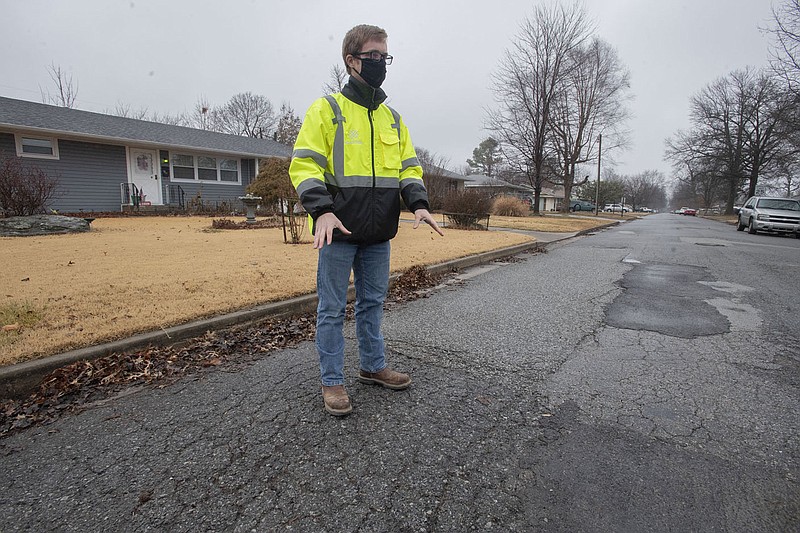SPRINGDALE -- The City Council should decide tonight whether to repair the worst streets first or do the work by zones.
A recent survey of all the streets helped the city staff prioritize repairs, said Ryan Carr, the deputy director of engineering.
A five-year program will start this summer to overlay streets with asphalt, spending about $1 million a year.
Brad Baldwin, director of engineering and public works, said the zoned approach should save money because it would mean less time and expense moving equipment.
The zones were determined by grouping projects costing about $1 million and minimize movement, Baldwin said. Overlay work would be completed in one zone a year.
The central zone of the city, including downtown, would be first if the council chooses the zone approach, Carr said. The survey identified more streets needing overlays in the central zone, which has the oldest streets in the city, he said.
Baldwin said a decision is important because city crews will need to start preparing the streets as soon as the snow melts. All streets deteriorate over time, and repairs become more costly, Baldwin said.
Baldwin said the city's last overlay program was completed in 2011.
The survey of street conditions rated about 80% as in good or fair condition, Carr told the City Council on Feb. 21. Only 1% received the lowest rating, "failed."
First Step Pavement Management of Conway spent last spring and summer driving the city streets, capturing digital images of the pavement and tagging them with geographical information system locations.
City engineers used the images to identify damage and prioritize repairs.
Old and worn
A look north up Shipley Street from its intersection with Porter Avenue last week showed a tree-lined residential street. But cracks crisscrossed the lane and the pavement seemed to be crumbling.
"It needs some work, but it's certainly not the worst street in the city," said Marian Bailey. Bailey lives on Shipley.
"Well, it's one of the worst," Carr said.
Chase Bowers, who also lives along that stretch of Shipley, shook his head when asked about his street.
"I work in asphalt," he said.
Carr last week pointed to "alligator cracking" in the asphalt on Shipley near its intersection with Porter. The crumbling asphalt resembles the scales of an alligator, he said.
The damage to Shipley probably rates worse than surrounding streets because the street is older, built in the 1940s or 1950s, he said. The street also receives heavy traffic. Its south end leads into a George's poultry plant.
Baldwin said weather and sun also break down asphalt. Water flows through the cracks in a street and weaken the gravel base layer and the ground, called the subgrade. Carr said alligator cracking indicates such conditions.
Streets in this condition are still safe to drive, he noted. "It might be a 25-foot patch, not a mile-long street," he said. "There are no sinkholes, but look out for the potholes," he said.
Quick Fix
The city will contract soon for the overlay work.
Laying asphalt can be tricky, Carr said. Weather conditions can't be too hot or too cold or too dry. Most work with asphalt runs from April to October.
Asphalt is the sludge remaining after the refining of gasoline and oil from crude petroleum, Baldwin said.
The first step to fixing a street brings in an 8-foot-wide milling machine to pull up asphalt on the street, he said. The machine grinds it up, and the contractor disposes of it or recycles it into new asphalt.
Baldwin said the asphalt coming to Springdale streets probably will contain some recycled content.
The next step has rollers driving over the newly laid asphalt to compact and smooth it.
Repairs of this level are expected to last 12 to 15 years, Baldwin said.
For streets such as Shipley with the most damage, city crews will dig out the affected areas down to the base layer and subgrade, then rebuild it, he said. If the first layer is wet because of rainwater through the cracks, the crews will keep digging until they find dry ground. If the base dirt is soggy, crews will bring in good dirt to replace it.
Then the contractor will come and overlay the patch.
"That's why we need to scramble," Baldwin said. "We need to get in there and fix these places before the contractors get here," Baldwin said.
Bigger fixes should last about 20 years, he said.
The two-step overlay process will take only a couple of hours until the asphalt is dried and ready for traffic, Baldwin said. Most streets in the city need only portions fixed.

More News
Proposed overlay streets
Springdale completed a survey in 2020 to determine the condition of its streets. The city has developed a list of roughly 100 streets to include in its overlay program. Only segments of the streets listed will be repaired. The survey didn’t prioritize the streets. Rather, just smaller sections showing problems will receive overlay. These are among the streets that will receive some overlay.
• Shipley Street
• Porter Avenue
• South Powell Street
• Shady Grove Road
• Backus Avenue
• North West End Street
• East Emma Avenue
• Butterfield Coach Road
• Oak Grove Road
• Champman Avenue
SOURCE: Springdale
Laurinda Joenks can be reached by email at joenks@nwadg.com or on Twitter @NWALaurinda.
